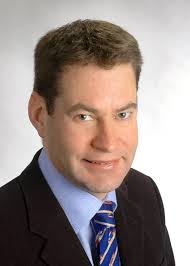
Murdo Fraser calls for radical overhaul of constitution in new Reform Scotland / Glasgow University lecture series.
A senior Conservative MSP is expected to call for the UK to federalise, in the first of a series of lectures organised by Reform Scotland and Glasgow University.
The 'Visions of Scotland' lecture series, the first of which takes place this evening at the University of Glasgow, will see representatives from different parties outline their vision for what Scotland will look like in future, whether under independence or as part of the UK.
This evening’s lecture features Murdo Fraser MSP, Conservative Enterprise Spokesman, and Michael Moore MP, the former Liberal Democrat Secretary of State for Scotland.
In his speech, Mr Fraser is expected to say:
"A referendum with a binary Yes/No question was always bound to polarise opinion. But is there really no common ground between these two different stances? Is there no alternative around which a substantial majority of the Scottish people could coalesce? I would suggest that federalism within the UK, if it were workable and could be achieved, is a solution which could unite both unionists, and many nationalists, and provide a secure framework for the future.
"The current devolved Scottish parliament operates more or less along the lines of a state legislature in many federal systems, the significant difference being the lack of tax varying powers. To create a federal system for Scotland, Wales and Northern Ireland would, therefore, be comparatively straightforward. It would involve entrenching in a written constitution the existence, and sovereignty of these institutions, moving some way to equalising their powers, and providing greater financial responsibility."
Outlining his views on England's place in a federal structure, Mr Fraser will say:
"The challenge to the federalist argument in a UK context has never, therefore, come from the currently devolved nations. It is, and has always been, this thorny question: what do we do about England?
"I think it is reasonable to conclude that if federalism is to work within the UK it cannot do so on the basis of England as a single unit. The problem that then immediately arises is that, until now, there has been little appetite within England for the sort of regional government that would be required to balance a Scottish parliament or Welsh or Northern Irish assembly. But given the concern within the North of England about being left behind as Scotland gets more and more power, I suspect that if there were now a credible proposal for regional government then the result of a referendum might be very different from that in 2004.
"An interesting development has been in London, where the establishment of the London Assembly, and the position of the elected Mayor, both seen as radical innovations when they were proposed, are now overwhelmingly accepted. Indeed, the current incumbent of the mayoral position, Boris Johnson, has been energetically campaigning for further devolution to London, including of legislative powers.
"It is quite possible to envisage a network of strong cities, or city regions, emerging to which powers could be devolved. We can then add into the mix historic counties with a strong local identity, such as Yorkshire or Cornwall. We do have areas such as the North-East or North-West, or East Midlands, which already have a coherent regional identity, and very quickly the map of England is filled up with a patchwork of local units, maybe not identical in geographic size, population or wealth, but all having an identifiable local focus."
Outlining how federalism could answer other controversial constitutional issues, Mr Fraser will say:
"What the sort of federal structure proposed would also allow us to do is to tackle two other thorny, and potentially irresolvable, constitutional problems: the West Lothian question and reform of the House of Lords. With a federal UK Parliament, and power passed down to local and regional governments, the voting rights of all Westminster MPs could remain exactly the same, as they would all be voting on the same range of issues as affected their constituents. The added bonus would be that there would be a strong argument for reducing the size of the House of Commons substantially.
"In relation to the House of Lords, a new federal UK structure would allow the existing upper house to be replaced with a Senate, providing equal representation for each federated part of the UK, thus providing the requisite political balance, and an appropriate counterweight to the House of Commons, with its own electoral mandate. If that makes the elected UK Government have to work harder to get its legislation through and take greater account of all geographic interests across the country, then so much the better."
Commenting on the perception amongst some unionists that the moves towards further devolution are constant, Mr Fraser said:
"Federalism is very much an event, not a process. Once established, and codified in a written constitution, changing the ground rules in any direction would be extremely difficult, and therefore a more stable constitutional framework for the UK established."
Commenting, Geoff Mawdsley, Reform Scotland's Director, said:
"We need fresh and challenging ideas for how we move on as a country after the referendum whatever the outcome, and Mr Fraser's intervention is a thought-provoking and welcome one.
"Later this year, we will be publishing a collection of essays which will be full of new ideas from people across the political spectrum, of which this is one."


 Man, 44, seriously injured in hospital after crash between Comrie and Rosyth
Man, 44, seriously injured in hospital after crash between Comrie and Rosyth
 John Swinney announces SNP leadership bid
John Swinney announces SNP leadership bid
 Closures on A92 from TONIGHT for roadworks
Closures on A92 from TONIGHT for roadworks
 13°C
13°C
 13°C
13°C
 15°C
15°C